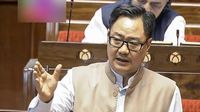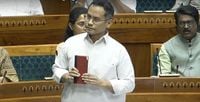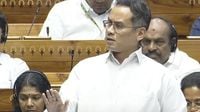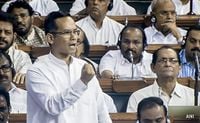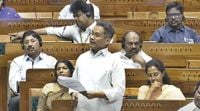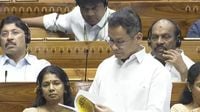In a heated session of the Lok Sabha on April 2, 2025, Congress MP Gaurav Gogoi launched a fierce attack on the government regarding the Waqf (Amendment) Bill, accusing Parliamentary Affairs Minister Kiren Rijiju of misleading the House with false claims. Gogoi described the bill as an "attack" on the Constitution and a tool to target the Muslim community.
During his speech, Gogoi stated, "This bill aims to dilute the Constitution, defame minority communities, divide Indian society, and disenfranchise minorities." He expressed concern that the government was using the Waqf Bill to further its political agenda, questioning the timing of its introduction, especially since the Ministry of Minority Affairs had not recommended any changes to Waqf laws as recently as September 2023.
Rijiju had previously criticized the UPA government's 2013 amendments, which he claimed allowed individuals from any religion to create Waqf properties. Gogoi countered this assertion, labeling it as "completely false and misleading" and challenged Rijiju to authenticate his claims. "This government thrives on false accusations, spreading rumors, and distorting facts," he said.
One of the most contentious provisions in the proposed amendments requires that a person must have practiced Islam for at least five years before declaring a property as Waqf. Gogoi questioned the rationale behind this requirement, asking, "Will they ask for a certificate from other religions whether you have completed five years or not? Why is this being asked in this bill?" He accused the government of interfering in religious matters and issuing 'religious certificates' to determine who qualifies as a practicing Muslim.
Gogoi further warned that the implications of the bill could extend beyond the Muslim community, stating, "Today, they are targeting the land of one community; tomorrow, it could be another." He emphasized that while amendments to the Waqf Act may be necessary, they should aim to strengthen the law rather than create divisions.
In the backdrop of these discussions, Rijiju defended the bill, asserting that it did not interfere with anyone's right to "profess, practice, and propagate religion," as guaranteed under Article 25(1) of the Indian Constitution. He argued that the amendments were solely focused on improving the management of Waqf properties and ensuring that the Waqf Board has precedence over other laws.
However, Gogoi dismissed Rijiju’s claims about the thorough discussions that preceded the bill's introduction. He stated that the Joint Parliamentary Committee (JPC) had failed to hold a proper clause-by-clause discussion and that none of the amendments suggested by the Opposition had been adopted. "Not a single amendment suggested by the Opposition has been adopted," Gogoi lamented.
The debate on the Waqf Amendment Bill has sparked significant controversy, with various opposition parties expressing their dissent. The Aam Aadmi Party and the Samajwadi Party have issued whips to their MPs to ensure their presence in the House during the discussions. The RJD leader Tejashwi Yadav has labeled the bill as unconstitutional, emphasizing the need to maintain the diversity of the country.
Gogoi's remarks reflect a growing concern among opposition leaders about the government's approach to minority rights and religious freedoms. He stated, "This is not just about one law. It is an attack on the very foundation of Parliament and an erosion of our Constitution." He accused the ruling government of pursuing four objectives through the amendment: diluting the Constitution, defaming minority communities, dividing society, and disenfranchising minorities.
As the debate continues, many are questioning the broader implications of the Waqf Amendment Bill and its potential impact on communal harmony in India. Gogoi's criticisms highlight the fears that the bill may set a precedent for further marginalization of minority communities.
In closing, the Waqf Amendment Bill remains a focal point of contention in Indian politics, with both sides entrenched in their positions. The outcome of the discussions in Parliament will likely shape the future of minority rights and the management of Waqf properties in the country.
